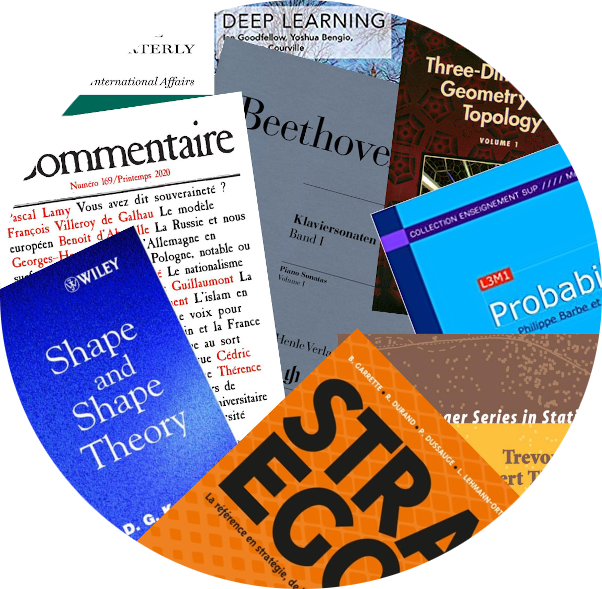 Philippe Barbe
Philippe Barbe

|
Should you hire a professional Mathematician?
|
Business is complex!
Most companies face a complex environment, a lot of uncertainty, a need for a vision and leadership to project the various stakeholders beyond the next quarter.
Yet, few corporations think of professional Mathematicians when looking for the talent needed to deal with the range of business problems they face.
Business leaders do not suspect that outside their ivory tower of theorems and core expertise in mathematics professional Mathematicians can address a wide variety of business challenges.
In Part 1 of this series, we saw that what professional Mathematicians do is not what most people think based on their experience of mathematics in college. Part 2 discussed the skills Mathematicians have that are useful in business far beyond their technical expertise including:
- care for precision,
- desire to understand all problems at a deep level,
- intellectual honesty,
- ability to think very conceptually,
- a collaborative mindset,
- courage and perseverance.
This article looks at other skills people seldom associate with Mathematicians, or associate for the wrong reason. Dealing with complexity
Most people find mathematics complicated. Ergo, if Mathematicians do complicated things, they must be able to deal with complex things.
A true statement, but not for the reason that most people think. It’s not about the complexity of the problems Mathematicians deal with that makes them good at handling complexity; it’s their ability to take something complex, make it simple, by seeing it differently, and then deal with it. Mathematics is simple.
Mathematicians do know a lot of mathematics, yet most Mathematicians will tell you that even their most complicated theorem boils down to a couple of simple ideas. Mathematicians are adept at dealing with complexity because they excel at reducing it.
They also have a fairly unique ability to zoom in an out of a problem. A 50-page proof is seemingly a complex object. It is built as an answer to a problem, which, by necessitating such a long proof, is a complex problem. Yet each part in the proof has a clear relation to the overarching goal of the proof. The structuring contributes to the simplification of the complexity.
In business, Mathematicians are able to focus on a product, on a project, knowing where it fits in the grand goal of the company and the industry, connecting the microscopic to the macroscopic.
Able to change their focus as needed and put forward the right concepts, Mathematicians are very capable of dealing with complex business and organizational problems, all the more since these problems seldom require a considerable technical knowledge but more an ability to connect the parts with the whole through effective concepts.
Dealing with ambiguity
Mathematics is a very unique discipline because of the notion of an absolute truth… a statement is true or false.
If a statement’s true or false status cannot be assessed then it is a hypothesis or a conjecture, but there is no ambiguity on its status.
Definitions are so precise that Mathematicians all agree on what exactly what an object is and can decide in a consistent manner if something is or is not that object. Given their highly rationalized world that brooks no ambiguity, why would Mathematicians be capable of dealing with ambiguity?
Similar to their skill dealing with complexity, because mathematics does not suffer any ambiguity whatsoever once it is manifested in terms of definitions, theorems and proofs, Mathematicians are remarkably apt at reducing vague ideas to conjectures and proofs, and if it cannot be reduced, to accept it.
Through their questioning they aim at making things precise, hence reducing ambiguity. They come up with examples and counter-examples that help clarify whatever situation and problems they have.
They are also used to not knowing the answer, failing to prove a conjecture. In which case, they do not know if something is true or false, and there is no ambiguity on this status.
Why is ambiguity annoying for businesses? Ultimately, people are annoyed when they fear something. By their ability to reduce or rationalize ambiguity, Mathematicians are able to accept the world as it is and communicate that vision to others, alleviating their fear.
No Mathematician will tell you if you will get head or tail in flipping a coin. But a Mathematician will tell you so much about coin tossing that you will toss with confidence if you have to, because you will know exactly what to expect.
Visionary
A theorem was once upon a time a conjecture, a product of the imagination.
Even though the subject is totally constrained by the implacable logic that drives proofs, even though definitions allow for no ambiguity at all, Mathematicians are very able to imagine what might be true. Not just one step ahead, but very many steps ahead.
Part 1 talked about how, from very few cases, Mathematicians can induct generalities, which requires a bold imagination. Conjectures are the expression of this imagination. But, conjectures have to be reasonably plausible, meaning that the vision has to remain grounded in what seems possible.
Because conjectures can be so difficult to prove, a Mathematician’s vision can take years to become reality. This is why Mathematicians are not afraid to look far into the future, very far. Yet, sensing the difficult path ahead, don’t set unrealistic expectations.
In business, that translates into their ability to conceive products, or set a long term vision for a company (sometimes quite a bold one) which are achievable.
If the C-suite considers visioning its’ prerogative, a company should carefully think of where to place Mathematicians in an organization, in particular if they are going to be employed for their skills beyond their technical expertise. They may be more suitable in a strategy group than an operational one, or better, in a transverse capacity.
Strategist
Transforming a conjecture into a proof is a complex process starting with what is currently known, and a vision of something which might be true.
No different than a company at a current state, trying to reach a future state set by a vision, doing mathematics is very much about setting a somewhat blurry vision or goal, then refining it as the proof is built.
Just like envisioning a new product or setting a corporate strategy, one starts with a somewhat vague idea of an objective, a software functionality, a future state. Then one needs to refine this vision as one tries to make it a reality.
For a software functionality, what will be the workflow? What will the user interface look like? How is the backend going to be implemented?
For a company’s future state, what partnerships are needed? What needs to be developed?
The thought process is exactly the same as that of proving a theorem: it is based on reason, observing how users will interact with the product, and refining as needed; it is based on observing the business environment, understanding competitive advantages, specializations, how pieces may fit well together.
A complex proof is not the product of writing some random symbols on a page and hoping for luck. It requires envisioning how to get from current state to future state, using reason, not emotion or wishful thinking. It consists in envisioning a series of steps, the lemmas to be, that will achieve a proof.
Isn’t that what strategy is? The ability to find a tangible path toward making a vision a reality?
Often, as the strategy is executed, a conjecture will evolve. A definition was not precise enough. A case had not been thought through. The conjecture is modified.
This is exactly what a strategy in business is: according to its horizon, it is more or less precise, solidifying as the horizon is nearing, bringing the enterprise closer to the goal set by its vision.
Leadership
Complex mathematical proofs may span several dozens of pages. They are NOT conceived in a moment, they are the product of many, many iterations in which the problem is refined, and broken into easier sub-problems.
Consequently, Mathematicians are remarkably adept at decomposing anything, be it a process or a goal. This is, in essence, their core analytical skills.
And, because they are so accustomed to reading proofs, verifying that something is true or false, and because they spend a considerable amount of time evaluating work of their peers they are also very capable at judging if a project is viable and if a goal has been fulfilled or not.
Combining their ability to decompose with their ability to evaluate, to see how the pieces together, what work is needed, to set a vision and build a strategy, Mathematicians can be outstanding leaders.
Facing the unknown
Inventing mathematics starts with facing the unknown and a degree of doubt. One must admit that one does not understand a situation: why is this true or false? Why does this problem not have an answer?
Like all scientists, Mathematicians are used to facing the unknown, are not afraid of it, and in fact embrace the unknown as it makes their life interesting.
Just starting requires optimism. Others failed to solve the problem or did not understand something. What makes you think you can come up with an answer?
One would assume that Mathematicians must have the utmost confidence to tackle the unknown Yet, most are not sure that they can come up with a proof of an interesting conjecture. It is their sense of curiosity and the desire to take the challenge that drives them.
Amazingly driven in fact, because they like their theorems to be difficult. They don’t think of themselves as driven and competitive because of their academic milieu and collaborative nature, but once in the business world, when compared to most people, they are amazingly competitive and driven.
Proving a theorem is an intensively personal quest. Doing it for years requires a lot of self-determination and the ability to sustain one’s interest in the problem in the face of seemingly endless failure. Dogged persistence is simply a normal part of the job. Working for a decade to solve a problem requires a lot of optimism, sustained interest, determination, faith in oneself, and a high degree of comfort dealing with the unknown.
The initial acceptation of non-understanding and ignorance that presents itself in an idea that will become a conjecture is often followed by the need to learn something on the specific subject. How much a mathematician likes to learn and are curious is partially reflected in their activity. Some tend to gravitate around a single topic, showing a propensity to learn deep, some work in different parts of mathematics, showing more willingness to learn wide. But all learn. Mathematicians are very good, and life-long learners.
The necessity of unassailable proof puts Mathematicians in a state of near constant failure until a proof is complete. The nature of doing Mathematics means that most days, even when there is small progress, failure to achieve the result is the norm. Proving a new theorem means a Mathematician has done what no one else has done before. Every day of their lives is doing something new!
Mathematicians like the unknown because they see possibilities. Not knowing does not stop Mathematicians, it motivates them.
In business, this translates to not being afraid to tackle new problems, to try new things, to be adventurous and take calculated risk, acting on reason and in a disciplined manner.
Conclusion
I have met many Mathematicians over the years, working across different fields, most of whom are particularly nice people driven by a desire to understand the world and express it as mathematical objects.
Beyond their core expertise, Mathematicians offer a variety of desirable qualities to businesses.
Their flaw? They do not advocate well for themselves!